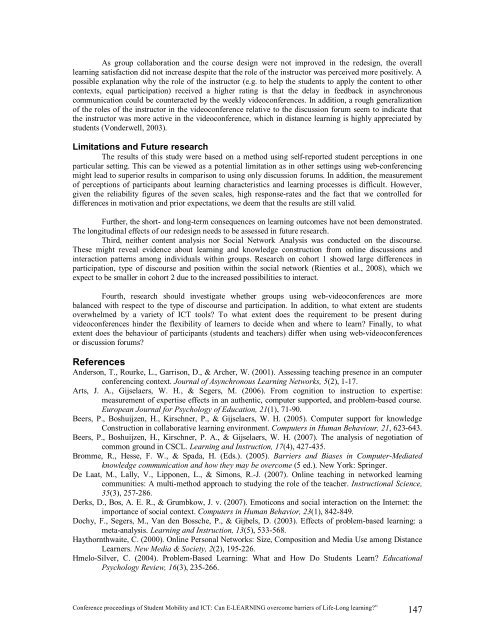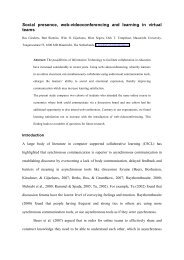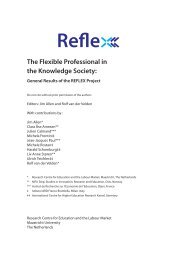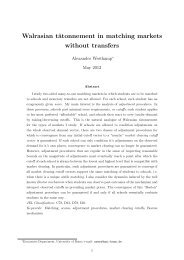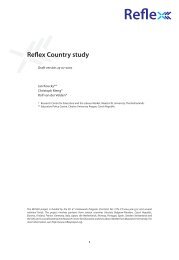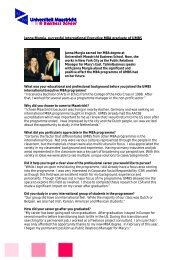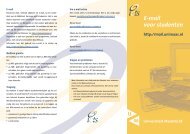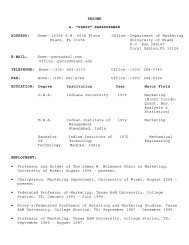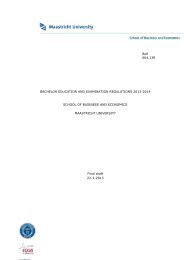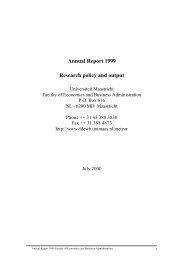proceedings of Student Mobility and ICT: Can E-LEARNING
proceedings of Student Mobility and ICT: Can E-LEARNING
proceedings of Student Mobility and ICT: Can E-LEARNING
Create successful ePaper yourself
Turn your PDF publications into a flip-book with our unique Google optimized e-Paper software.
As group collaboration <strong>and</strong> the course design were not improved in the redesign, the overall<br />
learning satisfaction did not increase despite that the role <strong>of</strong> the instructor was perceived more positively. A<br />
possible explanation why the role <strong>of</strong> the instructor (e.g. to help the students to apply the content to other<br />
contexts, equal participation) received a higher rating is that the delay in feedback in asynchronous<br />
communication could be counteracted by the weekly videoconferences. In addition, a rough generalization<br />
<strong>of</strong> the roles <strong>of</strong> the instructor in the videoconference relative to the discussion forum seem to indicate that<br />
the instructor was more active in the videoconference, which in distance learning is highly appreciated by<br />
students (Vonderwell, 2003).<br />
Limitations <strong>and</strong> Future research<br />
The results <strong>of</strong> this study were based on a method using self-reported student perceptions in one<br />
particular setting. This can be viewed as a potential limitation as in other settings using web-conferencing<br />
might lead to superior results in comparison to using only discussion forums. In addition, the measurement<br />
<strong>of</strong> perceptions <strong>of</strong> participants about learning characteristics <strong>and</strong> learning processes is difficult. However,<br />
given the reliability figures <strong>of</strong> the seven scales, high response-rates <strong>and</strong> the fact that we controlled for<br />
differences in motivation <strong>and</strong> prior expectations, we deem that the results are still valid.<br />
Further, the short- <strong>and</strong> long-term consequences on learning outcomes have not been demonstrated.<br />
The longitudinal effects <strong>of</strong> our redesign needs to be assessed in future research.<br />
Third, neither content analysis nor Social Network Analysis was conducted on the discourse.<br />
These might reveal evidence about learning <strong>and</strong> knowledge construction from online discussions <strong>and</strong><br />
interaction patterns among individuals within groups. Research on cohort 1 showed large differences in<br />
participation, type <strong>of</strong> discourse <strong>and</strong> position within the social network (Rienties et al., 2008), which we<br />
expect to be smaller in cohort 2 due to the increased possibilities to interact.<br />
Fourth, research should investigate whether groups using web-videoconferences are more<br />
balanced with respect to the type <strong>of</strong> discourse <strong>and</strong> participation. In addition, to what extent are students<br />
overwhelmed by a variety <strong>of</strong> <strong>ICT</strong> tools? To what extent does the requirement to be present during<br />
videoconferences hinder the flexibility <strong>of</strong> learners to decide when <strong>and</strong> where to learn? Finally, to what<br />
extent does the behaviour <strong>of</strong> participants (students <strong>and</strong> teachers) differ when using web-videoconferences<br />
or discussion forums?<br />
References<br />
Anderson, T., Rourke, L., Garrison, D., & Archer, W. (2001). Assessing teaching presence in an computer<br />
conferencing context. Journal <strong>of</strong> Asynchronous Learning Networks, 5(2), 1-17.<br />
Arts, J. A., Gijselaers, W. H., & Segers, M. (2006). From cognition to instruction to expertise:<br />
measurement <strong>of</strong> expertise effects in an authentic, computer supported, <strong>and</strong> problem-based course.<br />
European Journal for Psychology <strong>of</strong> Education, 21(1), 71-90.<br />
Beers, P., Boshuijzen, H., Kirschner, P., & Gijselaers, W. H. (2005). Computer support for knowledge<br />
Construction in collaborative learning environment. Computers in Human Behaviour, 21, 623-643.<br />
Beers, P., Boshuijzen, H., Kirschner, P. A., & Gijselaers, W. H. (2007). The analysis <strong>of</strong> negotiation <strong>of</strong><br />
common ground in CSCL. Learning <strong>and</strong> Instruction, 17(4), 427-435.<br />
Bromme, R., Hesse, F. W., & Spada, H. (Eds.). (2005). Barriers <strong>and</strong> Biases in Computer-Mediated<br />
knowledge communication <strong>and</strong> how they may be overcome (5 ed.). New York: Springer.<br />
De Laat, M., Lally, V., Lipponen, L., & Simons, R.-J. (2007). Online teaching in networked learning<br />
communities: A multi-method approach to studying the role <strong>of</strong> the teacher. Instructional Science,<br />
35(3), 257-286.<br />
Derks, D., Bos, A. E. R., & Grumbkow, J. v. (2007). Emoticons <strong>and</strong> social interaction on the Internet: the<br />
importance <strong>of</strong> social context. Computers in Human Behavior, 23(1), 842-849.<br />
Dochy, F., Segers, M., Van den Bossche, P., & Gijbels, D. (2003). Effects <strong>of</strong> problem-based learning: a<br />
meta-analysis. Learning <strong>and</strong> Instruction, 13(5), 533-568.<br />
Haythornthwaite, C. (2000). Online Personal Networks: Size, Composition <strong>and</strong> Media Use among Distance<br />
Learners. New Media & Society, 2(2), 195-226.<br />
Hmelo-Silver, C. (2004). Problem-Based Learning: What <strong>and</strong> How Do <strong>Student</strong>s Learn? Educational<br />
Psychology Review, 16(3), 235-266.<br />
Conference <strong>proceedings</strong> <strong>of</strong> <strong>Student</strong> <strong>Mobility</strong> <strong>and</strong> <strong>ICT</strong>: <strong>Can</strong> E-<strong>LEARNING</strong> overcome barriers <strong>of</strong> Life-Long learning?” 147


